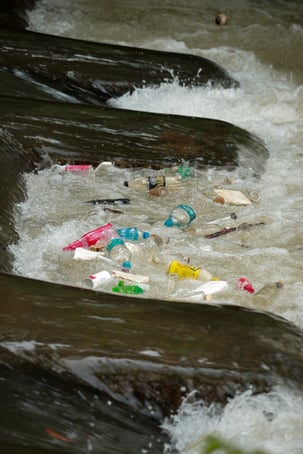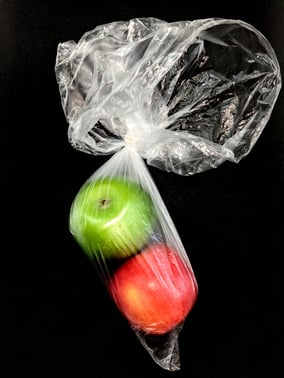 Once upon a time (a time that really wasn’t that long ago), human beings were limited by what existed in the natural world. But, someone somewhere did a little experimenting, a little mixing of some substances and chemicals, and they probably cried out “eureka!” when they realized they created a new, synthetic material. Suddenly, humans were no longer dependent on a dwindling supply of natural resources. We could endlessly imitate natural products without actually having to deplete those resources. We could create brand new products that were lighter, cheaper, stronger, and even more sanitary. We had started a revolution that led to a new modern era. Yet, after catapulting human progress, it has become one of our most insidious pollution problems.
Once upon a time (a time that really wasn’t that long ago), human beings were limited by what existed in the natural world. But, someone somewhere did a little experimenting, a little mixing of some substances and chemicals, and they probably cried out “eureka!” when they realized they created a new, synthetic material. Suddenly, humans were no longer dependent on a dwindling supply of natural resources. We could endlessly imitate natural products without actually having to deplete those resources. We could create brand new products that were lighter, cheaper, stronger, and even more sanitary. We had started a revolution that led to a new modern era. Yet, after catapulting human progress, it has become one of our most insidious pollution problems.
Plastics. They sure are tricky, forcing us to morally grapple with a material necessary for things like modern medicine and computers, but also a material that is unbelievably harmful to our natural environment and to us. A good start to tackling this issue is to eliminate what we don’t need, and recent Colorado legislation is helping us do that.
Enter the 2021 Plastic Pollution Reduction Act, or HB21-1162: a historic piece of plastics-reducing legislation signed into law by Governor Jared Polis this past July. The law is essentially four-pronged, targeting single-use plastics with a phase out approach. Here’s the breakdown:
Beginning in January, 2023, a $0.10 fee will be placed on plastic and paper carryout bags. The fee is broken down so $0.04 stays with the retailer, giving them some funding to implement the program, while $0.06 goes to municipalities and counties to help enforce the law and put together waste diversion programs or education efforts. This fee will mainly affect large grocery and retail stores. For now, restaurants and Colorado-only retailers with three or less locations do not need to comply.
On January 1, 2024, we start to wave goodbye to plastics. This is when the fee structure ends and the ban for plastic carryout bags begins. Again, this will mostly impact those larger grocery and retail stores. However, all restaurants and schools still have a part to play too. Also starting in 2024, polystyrene (styrofoam) food containers and cups (basically to-go food packaging) will be banned. 
The last and very key piece of the Plastic Pollution Reduction Act is the repeal of a 1993 plastic preemption law which denied Colorado local governments the ability to prohibit plastic materials for consumer products. The 2021 Act removes this preemption, therefore allowing local governments to not only enact but implement and enforce laws that restrict plastic and/or polystyrene materials. This will begin on July 1, 2024.
The 2021 Plastic Pollution Reduction Act won’t come as a major shock to our communities, since both Vail and Avon already have the $0.10 fee and a plastic bag ban in place. For those communities who have not started a phase out of plastics yet, remember that the goal of this law is not to place an unnecessary burden on businesses, but rather to nudge action to reduce the use of plastics that may not have happened through behavior change efforts alone.
The issue of plastic pollution is not something that just plagues the ocean, but affects us right here in Eagle County too. Plastics take up space within our local landfills, they break down into microplastics that add to toxic runoff from those landfills (this is retained in ponds), and they are a significant source of litter in our watersheds and ecosystems. Another entire article could be written about plastics’ impact on human health as well. So, while it is important to recognize the role plastics play in our current society, it is also important to recognize the harm done.
As the bill rolls out, this is the perfect opportunity for us all to get our reusable bags out and start thinking a little bit more about where our waste goes after we take it to the curb. Think about it from an overconsumption, a stewardship, a conservation, or even a health perspective. And if you have questions about what to do with your trash, check out our recycling and waste diversion resources at https://www.walkingmountains.org/sustainability-hub/recycling-and-waste-diversion/.
Claire Kantor is the Climate Action Coordinator at Walking Mountains Science Center.






